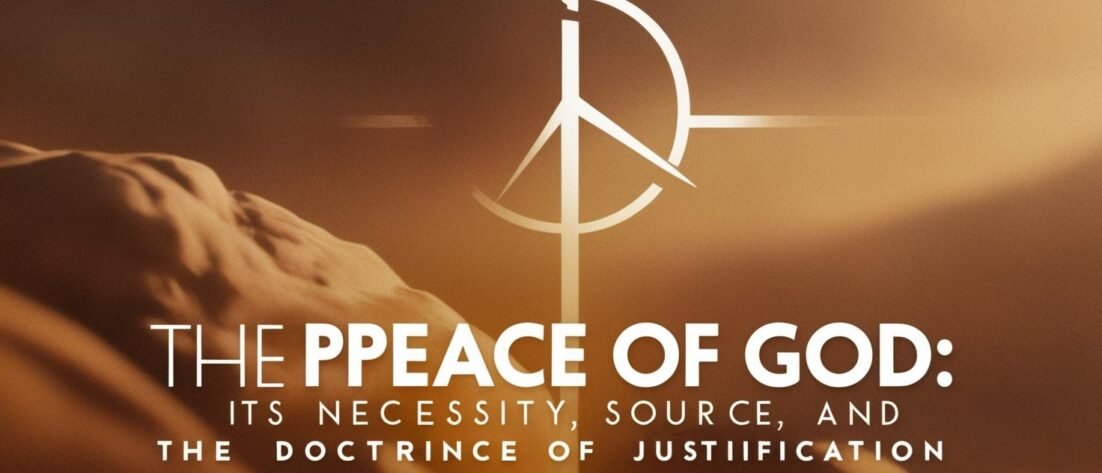In a world filled with chaos and uncertainty, God’s peace offers true rest, hope, and reconciliation. This peace is not a fleeting feeling but a lasting reality secured through Jesus Christ. Romans 5 explains why we need this peace, where it comes from, and how it transforms our lives. Let’s explore how the doctrine of justification reveals the peace of God and changes our relationship with Him and others.
The Necessity of the Peace of God
The Bible teaches that every person is born into enmity with God due to sin. Romans 5:10 (ESV) states:
“For if while we were enemies we were reconciled to God by the death of his Son, much more, now that we are reconciled, shall we be saved by his life.”
This separation manifests as spiritual unease. Augustine, in his Confessions, writes:
“You have made us for Yourself, O Lord, and our heart is restless until it rests in You” (Confessions, Book I, Chapter 1).
Without peace with God:
- We Are Separated from God: Sin alienates us from His holiness (Isaiah 59:2).
- We Lack Inner Peace: Anxiety and fear dominate when we are apart from the assurance of His grace.
- We Face Eternal Judgment: Without reconciliation, we remain under God’s wrath (John 3:36).
Without the peace of God, we cannot experience the fullness of life He intends for us (John 10:10).
The Source of the Peace of God
The peace of God is not something we achieve but something we receive. Its source is solely found in the person and work of Jesus Christ. Romans 5:1 (NIV) proclaims:
“Therefore, since we have been justified through faith, we have peace with God through our Lord Jesus Christ.”
This verse reveals the foundation of God’s peace:
- Justification by Faith
Justification is the act by which God declares a sinner righteous based on the merits of Christ’s obedience and sacrifice. This legal standing before God is not earned by works but is a gift received by faith (Ephesians 2:8-9). - Christ’s Atoning Work
Jesus bore the penalty for our sins on the cross, satisfying the justice of God. Through His resurrection, He secured our justification and peace (Romans 4:25). - The Holy Spirit’s Role
The Holy Spirit applies this peace to our hearts. Romans 5:5 (ESV) says:
“God’s love has been poured into our hearts through the Holy Spirit who has been given to us.”
The Doctrine of Justification
The doctrine of justification lies at the heart of the gospel and provides the theological foundation for understanding the peace of God.
- Definition of Justification
Justification is a forensic (legal) declaration by God that a sinner is righteous based on the imputed righteousness of Christ. This means our sins are forgiven, and Christ’s righteousness is credited to us (2 Corinthians 5:21). - The Means of Justification
- Faith Alone: Justification is received through faith apart from works (Romans 3:28).
- Grace Alone: It is a gift of grace, unmerited and undeserved (Romans 3:24).
- Christ Alone: Christ’s obedience and sacrifice are the sole basis for our justification (Romans 5:19).
- Results of Justification
- Peace with God: Romans 5:1 assures us that we are no longer enemies of God but His reconciled children.
- Access to God: Romans 5:2 (NIV) says: “Through him we have also obtained access by faith into this grace in which we stand.” We can now approach God with confidence (Hebrews 4:16).
- Hope in Suffering: Justification gives us a hope that transcends trials, knowing that our suffering produces perseverance, character, and hope (Romans 5:3-5).
- Assurance of Glory: Justification guarantees our future glorification. Romans 8:30 reminds us that those justified will also be glorified.
Results of the Peace of God in Our Lives
The peace of God transforms not only our relationship with Him but also every aspect of our lives.
- Reconciliation with God
Through justification, we move from enmity to fellowship with God. This peace gives us rest for our souls (Matthew 11:28-30). - Inner Peace
Philippians 4:7 (NIV) promises:
“And the peace of God, which transcends all understanding, will guard your hearts and your minds in Christ Jesus.”
This peace protects us from anxiety, grounding us in God’s sovereignty and care. - Peace with Others
The peace we have with God overflows into our relationships:- Forgiveness: We forgive because we have been forgiven (Ephesians 4:32).
- Reconciliation: We seek to live at peace with others, as Paul exhorts in Romans 12:18.
- Unity: The peace of Christ unites believers as one body (Colossians 3:15).
- Hope for the Future
The peace of God assures us of our eternal destiny. Romans 5:2-5 fills us with hope that will not put us to shame because God’s love has been poured out into our hearts.
Conclusion
The peace of God is both a gift and a reality that every believer can experience. Rooted in the doctrine of justification, this peace reconciles us to God, transforms our inner lives, and enables us to live in harmony with others.
As Romans 5 reminds us, this peace is not something we earn but something Christ secured for us through His life, death, and resurrection. Let us live in light of this truth, resting in the assurance of God’s peace and sharing it with a world desperately in need.
Paul’s prayer in 2 Thessalonians 3:16 (NIV) beautifully encapsulates this hope:
“Now may the Lord of peace himself give you peace at all times and in every way. The Lord be with all of you.”
May this peace guide your heart, shape your relationships, and give you hope as you walk with Him.







